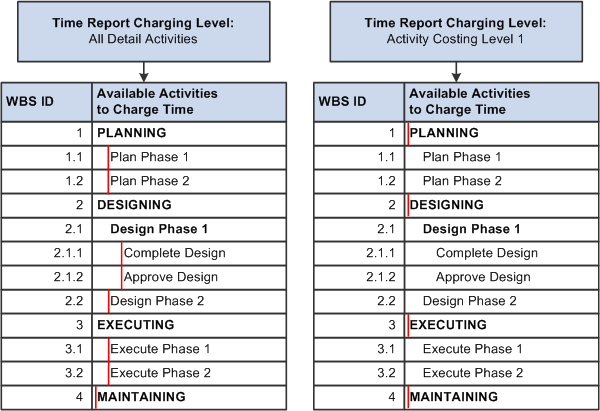Understanding Integration with Expenses
PeopleSoft Expenses is a robust application that is designed to track employee time and expense. Through the integration process, you can pull time and expense entries into PeopleSoft Project Costing for pricing transaction rows, project reporting, analysis, and customer billing.
These are the high level steps to integrate time and expense data to PeopleSoft Project Costing:
In PeopleSoft Expenses, configure time and expense reports to charge expenses to project-related accounting ChartFields, such as PC business unit, project, activity, source type, category, and subcategory.
Optionally specify different ChartField values for each expense or time report line item.
In PeopleSoft Expenses, approve and post expense transactions, which populates the Expenses Accounting Line table (EX_ACCTG_LINE).
In PeopleSoft Expenses, stage time entries to the Time Staging for Project Transaction table (EX_PROJ_RES_STG).
In PeopleSoft Project Costing, run the Expenses to Project Costing Application Engine process (PC_EX_TO_PC) to pull staged expense transactions from the Expenses Accounting Line table, and staged time transactions from the Time Staging for Project Transaction table, into PeopleSoft Project Costing tables where billable items can be passed to PeopleSoft Billing.
Use the ‘Setup Integration Exclusions’ to selectively apply criteria to exclude transactions from the integration into Project Costing. For more information, see Excluding Transactions from Integrations into Project Costing.
If you use PeopleSoft Program Management and PeopleSoft Expenses, you can enter time reports for all detail activities, or specify the level of activities on the work breakdown structure (WBS) for which you want to capture time against a project. The level at which you capture costs for a project can be different than the level at which you report time in PeopleSoft Expenses.
Use the time report charging level of All Detail Activities to report time in PeopleSoft Expenses at the detail activity level. Use the time report charging level of Activity Costing Level to charge time in PeopleSoft Expenses only to summary activities and detail activities that reside in the specified project charging level.
This diagram shows examples of two different time report charging levels for a project. In each example the orange vertical bar aligns with the activities to which you can charge time:

If you use a time report charging level of All Detail Activities, users with the appropriate security access can select any detail activity to charge time in PeopleSoft Expenses. If you use a time report charging level of Activity Costing Level, the list of activities to which users can charge time in PeopleSoft Expenses is based on summary and detail activities that reside in the specified project charging level.
Based on the time report charging levels illustrated in the previous diagram, the following diagram compares two different lists of available activities from which users can select when they create a time report for the project:

If you capture activity costs at the project charging level, and enter time reports for all detail activities, the system creates time transaction rows for the project charging level parent activity during the PeopleSoft Expenses integration. The Project Transaction table (PROJ_RESOURCE) retains the original detail activity ID from the time report.
Note: If you enter time reports only at the project charging level, the Project Transaction table will not retain the time report activity detail.